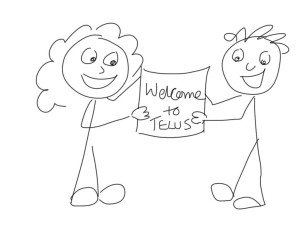ocTEL Week 2 is all about Understanding Learners’ Needs: http://octel.alt.ac.uk/course-materials/understanding-learners-needs/
Questionnaires and Needs

Public domain image from: http://pixabay.com/en/soap-bubble-ball-question-mark-63982/
Looking at the initial focus on questionnaires and other tools that existing instituions had produced in order to gauge learners needs was a starting point:
- Penn State University: Online Readiness Assessment
- San Diego Community College: Online Learning Readiness Assessment
- Illinois Online Network: Self Evaluation for Potential Online Students
- University of Houston: Test of Online Learning Success
I have to admit to not being bowled over by the visual design or types of questions that were being asked by these tools (as also echoed by Kathrine Jensen). I would be worried that the more technically savvy students would be dismissive of the design and approach taken by some of these tools… perhaps more interactivity and a demonstration of the experience that awaits online learning might enable richer responses and understanding from potential students.
However, this aside a division was highlighted in the types of questions that were being asked.
- Some were concerned with the technical competence and confidence of students.
- Some were concerned with the engagement and distance aspects of learning.
Both are important aspects to consider – the confidence with using the new technology – and the educational considerations of learning in a new environment.
It was interesting to see these tools as I had previously developed ‘training needs analysis’ style questionnaires for academic staff taking part in a 6-session course around enhancing their digital literacy and confidence with new technology called TELUS, which was collaboratively created with colleagues.
Please feel to free to view and fill in some of these:
-
SWOT Analysis of You and Technology Enhanced Learning. To fill it out, visit:
- Training Needs Analysis Session #2 Using and Creating Digital Resources. To fill it out, visit:
https://docs.google.com/spreadsheet/viewform?fromEmail=true&formkey=dFBZUHNNTXBSRXh1dUNIODVTSXUzd1E6MA -
Training Needs Analysis Session #3 Digital Literacy & Copyright. To fill it out, visit:
- Training Needs Analysis Session #4 Social Media in Education. To fill it out, visit:
https://docs.google.com/spreadsheet/viewform?fromEmail=true&formkey=dDFPRWZIaHFWUnFfd2lteG45X1pmSkE6MA - Training Needs Analysis Session #5 Collaborating Digitally. To fill it out, visit:
https://docs.google.com/spreadsheet/viewform?fromEmail=true&formkey=dDlpRkxzQTk0TGh4cGlkeWJ5YVNYUEE6MA
“Getting Started”
For five years I was involved with online distance learning courses at the University of Sheffield and as well as providing a lot of up-front information and support in the interview process for the course trying to understand the needs of the learners was enabled through a “getting started” process at the beginning of the course – much like with week zero on ocTEL. This process both enabled a safe exploration of the online environment identifying any areas of weakness, help or familiarisation needed. Activities such as posting profile information also started the online building of a community and engagement with the style of learning enabled.
Activity 2.1: Learner expectations
Find a colleague or someone else you know who has limited experience of online learning and TEL and discuss the following topics with them.
-
Using the ‘readiness for online learning’ themes that you identified in the previous activity, discuss the extent to which they feel ready to engage with TEL.
-
What expectations and concerns do they have about using TEL?
-
Do these expectations resonate with your experience of this course?
For Activity 2.2 I’m using retrospective experience of enabling and supporting staff getting to grips with online learning – both as from their own perspective of teaching and their understanding of learners needs.
Previously within the School of Nursing and Midwifery some staff had been on the Sheffield College’s LeTTOL Course in order to gain experience of being a student online – I also took part in this course and found it invaluable.
Concerns about engaging for the first time were:
- Unsure of time commitment
- Unsure of process of learning online
- Unsure of being able to get to grips with the technology
- Activity not being seen in the ‘real world’ and hence not acknowledged by colleagues/others/
- How will I be able to interact with other students
Activity 2.2: Researching themes in learner needs
Consider one or more of these four themes:
- The nature of adult learning and implications for practice (tags: ocTEL, adultlearning)
- Studies of online expectations and ‘readiness’ (tags: ocTEL, readiness)
- Implications of digital literacy (tags: ocTEL, diglit)
- Implications for your teaching approach/delivery and implementation (tags: ocTEL, delivery)
Theme 3 - Implications of digital literacy
Digital literacy is oft-quoted and conceptualised as those that are ‘native’ and have an innate understanding / skillset (‘younger people’) and those that are ‘digital immigrants’ and are lacking / playing catchup.
I’m more personally convinced not by this divise argument which splits along age and generations but by how people actually use technology in terms of level of engagement (as described in more detail through the concept of digital visitors and digital residents http://www.learningtechnologist.co.uk/2013/04/11/digital-visitors-and-digital-residents-food-for-thought-for-octel-and-work/)
Therefore students and academics alike who for whatever reason need or want to engage in online learning need to enabled to become digital residents… making the unfamiliar to the familiar…
Theme 4 - Implications for your teaching approach/delivery and implementation
As a learning technologist it seems that there is often an unmet need for both staff and student development with using technology for education.
In my previous departmental role this need urged me to collaborate with colleagues in producing a TELUS a technology-enhanced programme of six sessions for staff in the department covering many aspects of technology enhanced learning.
TELUS is a staff personal development course, developed in-house in order to bridge the gap in online teaching and learning pedagogy for staff at the university. The course aims to equip academic staff with the knowledge and experience in the use of educational technologies and how to plan and develop an effective online course for their students.”
The intention would be to then build upon this experience to develop a second programme of sessions focusing solely on designing and teaching using distance learning.
In all of this considering the needs of learners was paramount to understanding the purposes and rationale for using technology enhanced learning.
Certainly, this is still a sector-wide challenge to enable both staff and students to make the best use of learning enhancement through technology and the continued debate around ways to enable change in a positive way is still central to enabling digital literacy.
Next stop is a discussion thread on ocTEL about enabling digital literacy and understanding learners needs: “Not ready” http://octel.alt.ac.uk/forums/topic/not-ready/#reply-2938


